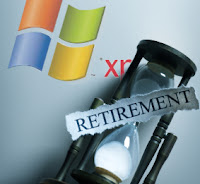Many of you have probably read or heard that the venerable Windows XP operating system is being retired next year. We are in fact less than one year away from that event. Considered revolutionary in its time, XP was released worldwide for retail sale on October 25, 2001. It’s hard to imagine ANY technology lasting for over 13 years in today’s fast changing environment but XP will have done that and more before its final bell is rung.
What does retirement mean to you? It means that Windows XP Pro will no longer receive any sort of updates or support from Microsoft. Those crazy folks out there who create malware to vex the rest of us honest business people will have a field day. If you have ever examined the list of patches on a Windows XP computer it is nothing short of massive. This is because of the far different environment we live in today vs. 2001 when this version of Windows was created. Microsoft has been hard pressed to close all the holes in this operating system as it ages and when they stop, the result will be quick and possibly brutal.
A few years back the Windows NT Server software was retired. We had a client at the time that had an NT server in their network for archival purposes. We warned them many times about the risks but they felt the archival value was worth more than the risk. One day they arrived to find that server completely wiped clean. A really nasty Trojan had located the NT server and re-partitioned the hard drive making data recovery impossible. A good backup was in place so we were able to restore the server in a reasonable amount of time. Because it was archival data, there was no interruption of business but it was unsettling to the client to say the least.
We began discussions on replacing the server over the next few weeks. Since little or no harm had come to the client as a result, they felt there was little urgency to rectify the problem. On exactly the 30 day anniversary the server was once again wiped clean. Needless to say, the server was replaced a few days later. Had we not taken precautions with the data by insuring a complete backup and warning the client, this could have been disastrous for them.
When Windows XP retires, it will not be long before a network with a Windows XP machine will be infected. Often a firm does not even know an infection has been introduced and firm data – especially things like contact lists - can be harvested to devastating and embarrassing result. No anti-malware in the world will save a firm from this sort of intrusion.
While the jury is still out on Windows 8, Windows 7 has been a fantastic operating system almost since day one. Given that the legal industry is easily the slowest to support any new technology, the transition from Windows XP (and Vista!) networks to Windows 7 went extremely well. Best of all with the new Windows versions you can now see and utilize ALL of the memory in your computer. Not only is it easy to move from Windows XP to Windows 7 – but you also get a significant speed increase, plus far better stability and reliability.
The problem many Windows XP firms will face is related software upgrades. We know of many firms who are clinging to Windows XP to support a very old piece of software. Often this is crucial software such as old time & billing systems or litigation support packages for example. More often than not, the reason the old software is in place has to do with expired support contracts or the cost of upgrades rather than functionality, but occasionally there are functional differences. We review two or more prospective networks per week and we see this often so if you are in this boat, don’t feel alone.
At some point, even firms that have fallen into this situation must take action. So consider the implications of a major application that needs a major upgrade. This takes planning, forethought, and often the support of an experienced legal vendor or consultant. No matter what it will take, planning is crucial and a big picture view is more important than ever.
If you have a Windows XP or a mixed network it is time to start planning. You cannot risk the types of attacks that will become prevalent once support stops and you will need time to sort out all of the implications of the change.
- Have your IT vendor perform an inventory or utilize one of small number of Legal Specific resellers in your area to do so.
- If you have your own IT department they will be able to help as well, but it is important to get expert assistance and make sure all application needs are considered.
- Compare the requirements to your existing network.
- Formulate a plan with the assistance of your IT provider or department.
- Use the plan to create a budget for financial planning purposes.
- Set a timeline to insure that all changes are completed before the retirement of XP.
- Use this opportunity to do other things such as standardization, streamlining processes and reducing maintenance costs.


No comments:
Post a Comment